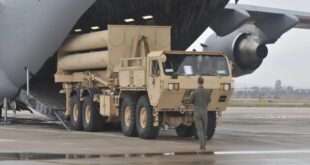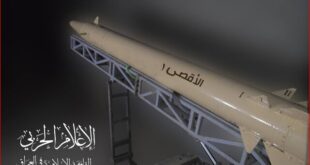The New York Times US daily revealed that Hizbullah’s participation in Syria war has been a source of foreboding to the Zionist entity.
Quoting “Israeli” officials and experts, the newspaper stated: “Hizbullah is acquiring battlefield experience, and the only way for al- Assad, a longtime Hizbullah ally, to repay the group is by supplying it with sophisticated weapons.
“Hizbullah has 4,000 to 5,000 soldiers today in Syria,” a senior “Israeli” military officer told reporters at army headquarters here last week. “This is a major burden for Hizbullah but also a major advantage.”
Speaking on the condition of anonymity in accordance with “Israeli” Army rules, an “Israeli” official added, “I have no doubt that Hizbullah gained much more self-confidence because of the Syrian experience.”
In their view, the experience gained by Hizbullah’s commanders and fighters in Syria is likely to make that next round more challenging for “Israel”.
“This kind of experience cannot be bought,” said Gabi Siboni, director of the military and strategic affairs program at the so-called “Institute for National Security Studies at Tel Aviv University”.
Siboni and other analysts said that Hizbullah’s experience in Syria should not be overstated since the group is fighting armed forces like the so-called “Free Syrian Army” extremist and groups, not a modern, regular army. Still, Siboni said: “It is an additional factor that we will have to deal with. There is no replacement for experience, and it is not to be scoffed at.”
While the “Israeli” military used to plan for conventional armored battle – tanks against tanks – now its forces train to withstand fighters who have antitank missiles and secret underground hide-outs.
Over the last two years, according to military officials, much “Israeli” Army training has moved from the southern desert to the Galilee region in the north, where the terrain is similar to that of Lebanon and Syria.
At the same time, the “Israeli” military is conducting a mostly covert campaign to maintain a qualitative edge over Hizbullah and curb the buildup of the group’s weaponry.
“A Hizbullah with modern surface-to-air systems, with modern UAV’s, with modern cyber-capabilities, well, this is a different Hizbullah,” the senior military official said, one that could have “much more appetite to taste another conflict with “Israel”.”
In a departure from its usual practice of remaining silent about the “Israeli” airstrikes, Hizbullah openly accused “Israel” of striking one of its positions on the Lebanon-Syria border on the night of Feb. 24, and it threatened to retaliate at a time and place of its choosing.
Days later, in another unusual development, “Israeli” forces in the Golan Heights fired artillery shells at a small squad of men, who were said to have been trying to plant an explosive device. The “Israeli” military described the men as “Hizbullah-affiliated terrorists.”
If the men were indeed affiliated with Hizbullah, the episode could indicate that the group has started operating against “Israel” in a new arena, along the decades-old cease-fire line between “Israel” and Syria.
 WILAYAH NEWS VOICE OF THE GLOBAL AWAKENING
WILAYAH NEWS VOICE OF THE GLOBAL AWAKENING






